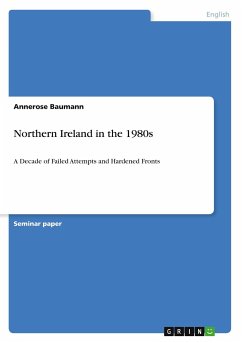
Britain on the edge of Europe - British-European relationships between 1945-58. The attempts to create a European community and Britain´s attitude towards it

PAYBACK Punkte
0 °P sammeln!
Studienarbeit aus dem Jahr 2003 im Fachbereich Anglistik - Kultur und Landeskunde, Note: 3+, Universität Rostock (Institut für Anglistik/Amerikanistik), Veranstaltung: Hauptseminar, 8 Quellen im Literaturverzeichnis, Sprache: Deutsch, Abstract: Never before it seemed so necessary for European countries to demonstrate strong company than after World War II. Some countries immediately started to meet and talk about what could be done to prevent Europe for wars like the one that just ended. The idea of forming a federation with one government as head was not new. Even in earlier stages in histo...
Studienarbeit aus dem Jahr 2003 im Fachbereich Anglistik - Kultur und Landeskunde, Note: 3+, Universität Rostock (Institut für Anglistik/Amerikanistik), Veranstaltung: Hauptseminar, 8 Quellen im Literaturverzeichnis, Sprache: Deutsch, Abstract: Never before it seemed so necessary for European countries to demonstrate strong company than after World War II. Some countries immediately started to meet and talk about what could be done to prevent Europe for wars like the one that just ended. The idea of forming a federation with one government as head was not new. Even in earlier stages in history countries tried to unify Europe. At that time the means of reaching the aim were invasion and elimination. The war led by Hitler was the last attempt to reach uniformity by force. The smaller European countries started to talk about integration and about forming a customers union as a first step. Great Britain, still a leading power in world trade and politics, did not feel as a part of Europe. Politics after World War II to 1958 were mainly dominated by the relationship between Great Britain and continental Europe. Mainly the Six wanted an integration of Western Europe. Britain did not feel comfortable with the idea of being part of a union and did not want to join the other states. They did not cooperate; contrariwise, they worked against the efforts of the other states. Great Britain jammed the attempts to form close mergers, so the formation of the European Economic Community and the concept of a common market was hard to get through by the other European countries. The aim of this paper is to give an overview about the processes of forming economic and political institutions and the attitude of Great Britain to the Continent between 1945 and 1958. The attempt is made to give reasons for Britain s attitude and its decision against a common market. The most important events during this period will be researched and evaluated. However, this is just an approach; it
is not possible to give any detailed aspects why Britain and the Continent could not work together.
is not possible to give any detailed aspects why Britain and the Continent could not work together.













